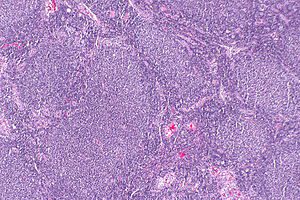Contents
Follicular lymphoma
Follicular lymphoma is cancer affecting specific cells of the immune system. The management depends on the progression of the lymphoma and the condition of the person concerned.
What is follicular lymphoma?
Definition of follicular lymphoma
Follicular lymphoma is one of the most common types of non-Hodgkin lymphoma (between 20% and 30% of cases). Non-Hodgkin lymphoma is cancer affecting cells of the immune system, which are certain cells involved in the body’s defense.
In the case of follicular lymphoma, the cells concerned are the B lymphocytes responsible for the production of antibodies. The term “follicular” refers to the arrangement of cells that cluster together in a lymph node or other tissue.
Follicular lymphoma occurs when a B lymphocyte becomes abnormal and multiplies out of control. The accumulation of these cells leads to the formation of one or more tumors which are generally localized in the lymph nodes. However, these tumors can also develop in the spleen, bone marrow, and other organs.
The progression of follicular lymphoma is usually slow. Nevertheless, it happens that it becomes aggressive and evolves quickly. Early detection is essential to limit the risk of complications.
Causes and risk factors
The causes of follicular lymphoma have not yet been clearly established. However, studies have highlighted risk factors that could promote cancer development:
- environmental factors such as exposure to pesticides and certain chemicals;
- lifestyle factors such as smoking and excessive alcohol consumption.
Diagnosis of follicular lymphoma
A characteristic sign of follicular lymhoma, abnormal swelling of one or more lymph nodes can be seen by palpation. This clinical examination may be supplemented by blood tests, medical imaging tests and a biopsy (taking a sample of tissue).
People affected by follicular lymphoma
Although it can appear at any age, follicular lymphoma is rarely seen before the age of 35. It appears most often from the age of 50, the average age of diagnosis being between 55 and 60 years. In France, around 2500 new cases are diagnosed each year.
Symptoms of follicular lymphoma
Swollen glands
The most common sign of follicular lymphoma is an enlargement of one or more lymph nodes. The swelling is usually painless, even when the nodes become apparent. Swollen lymph nodes are more often seen in the neck or armpits but can also be located in other areas of the body such as the chest and abdomen.
Other possible signs
Swollen lymph nodes may be accompanied by symptoms such as:
- tiredness ;
- fever ;
- heavy night sweats;
- weight loss.
Treatments for follicular lymphoma
The management depends on the progression of the lymphoma and the condition of the person concerned.
Medical supervision
When follicular lymphoma is diagnosed early, is at an early stage or has a low risk of progression, simple medical surveillance is put in place.
Radiotherapy
When follicular lymphoma is poorly developed or localized, radiotherapy may be offered. It consists of exposing the tumor area to rays which will destroy the diseased cells.
Immunotherapy
In the more advanced forms, immunotherapy is usually offered. Its objective is to stimulate the body’s immune defenses to fight the development of cancer cells.
Chemotherapy
Immunotherapy is most often combined with chemotherapy, which involves the use of chemicals to kill cancer cells.
Prevent follicular lymphoma
As with many types of cancer, preventing follicular lymphoma is primarily about maintaining a healthy lifestyle. It is therefore recommended in particular to:
- maintain a healthy and balanced diet;
- do not smoke or quit smoking;
- limit the consumption of alcoholic beverages.










